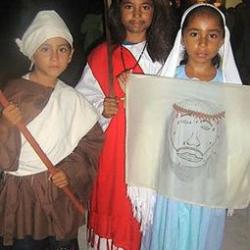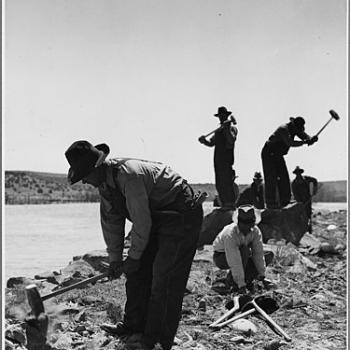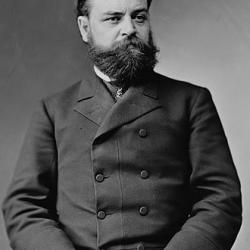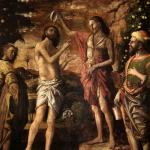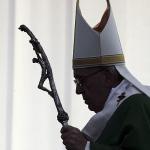Last Time on HORATES
Frankenstein’s Silent Night 1810 – 1819 |
A Quick Retrospect Of The Years 1810 – 1819. (patheos.com)
This Time We Take A Look At Around 2 Centuries Ago Starting In
1820
- March 15, 1820– Maine is admitted as the 23rd U.S. state.
- November 20, 1820– An 80-ton sperm whale attacks the Essex, a whaleship from Nantucket, Massachusetts, 2,000 miles off the western coast of South America. Herman Melville‘s 1851 novel Moby-Dick is in part inspired by this story.
- March 26, 1820 Joseph Smith, Mormon Prophet – Likely date when Joseph Smith, founder of the Latter Day Saint movement, receives his First Vision in Palmyra, New York (possibly March 26).

- Daniel Boone (November 2, 1734 – September 26, 1820) dies. He was an American pioneer and frontiersman whose exploits made him one of the first folk heroes of the United States. He became famous for his exploration and settlement of Kentucky, which was then beyond the western borders of the Thirteen Colonies.
1821
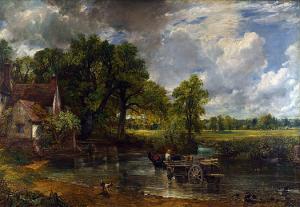
- Saint Elizabeth Ann Seton (1774–1821) the first person born in what would become the United States to be canonized dies. – American Catholic History
- March 4, 1821– James Monroe begins his second term, as President of the United States
- May 5, 1821 Emperor Napoleon dies in exile on Saint Helena of stomach cancer.
- July 10, 1821 – The United States takes possession of its newly bought territory of Florida from Spain.
- August 4, 1821 – The Saturday Evening Post is published for the first time, as a weekly newspaper in the United States.
- August 10, 1821 Missouri is admitted as the 24th U.S. state.
1822
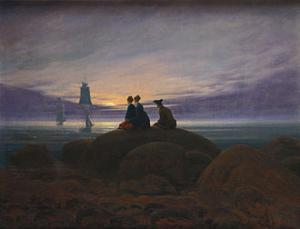
- January 7,1822 – The first group of freed slaves from the United States arrive on the west coast of Africa, founding Monrovia on April 25.
- June 6, 1822– Alexis St. Martin is accidentally shot in the stomach, which leads the way to William Beaumont‘s studies on digestion.
- 1822 Acupuncture The Chinese Emperor signed a decree excluding the practice of acupuncture from the Imperial Medical Institute. He said it was unfit for practice by gentlemen-scholars. In China acupuncture was increasingly associated with lower-class, illiterate practitioners.
1823
- May 25, 1823– The Catholic Association, a campaign for religious emancipation, begins in Ireland at a meeting of 13 people at a bookseller’s house on Capel Street in Dublin.
- August 20, 1823– Pope Pius VII dies after a reign of more than 23 years that began on March 14, 1800; he is remembered for crowning Napoleon Bonaparte as Emperor of France.
- September 22, 1823 – Joseph Smith first goes to the place near Manchester, New York, where the golden plates are stored, having been directed there by God through an angel (according to what he writes in 1838).
- Home! Sweet Home!” w. John Howard Payne m. Henry Bishop
NEW POPE
September 28,1823 – Roman Catholic Cardinal Annibale della Genga is elected Pope Leo XII
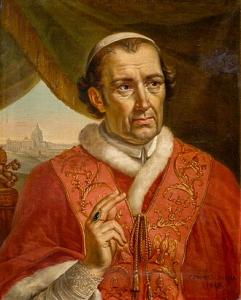
1824
Picture This
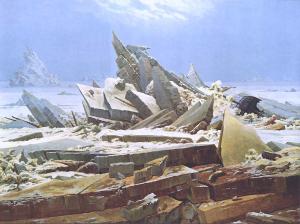
Caspar David Friedrich – The Sea of Ice
News of the World
- March 11 – The United States War Department creates the Bureau of Indian Affairs.
- March 19 – American explorer Benjamin Morrell departs Antarctica after a voyage later plagued by claims of fraud.
- April 9 – The first permanent settlers arrive to construct the new city of Tallahassee, Florida, selected to be the capital of the Florida Territory newly acquired from the Kingdom of Spain; the area has been selected because it is roughly equidistant from the territory’s main cities, Pensacola and St. Augustine.
- December 24 – The first American fraternity, Chi Phi (ΧΦ), is founded at Princeton University.
Arrivals
- January 8 – Wilkie Collins, British novelist (d. 1889)
- January 21 – Thomas Jonathan “Stonewall” Jackson, American Confederate general (d. 1863)
- December 10 – George MacDonald, Scottish writer (d. 1905)
Departures
- February 9 – Anne Catherine Emmerich, German Augustinian Canoness, mystic, Marian visionary, ecstatic and stigmatist (b. 1774)
- December 5 – Anne Louise Boyvin d’Hardancourt Brillon de Jouy, French confidant of Benjamin Franklin (b. 1744)
Publications Hot of the Press
- James Fenimore Cooper (anonymously) – The Pilot: A Tale of the Sea (published January, dated 1823)
- Washington Irving (as Geoffrey Crayon, Gent.) – Tales of a Traveller
- Mary Russell Mitford – Our Village
Sanctifying Time
- Pope Leo XII proclaims a universal jubilee.
- Ubi Primum – On His Assuming the Pontificate, Pope Leo XII, May 5, 1824
- Pope Leo XII – Quod Hoc Ineunte – Proclaiming a Universal Jubilee, May 24, 1824
- On June 13, 1824, the future Catholic saint John Henry Newman was made an Anglican deacon at Christ Church Cathedral, Oxford.
The Sound of Music and Other Cultural Milestones
O Tannenbaum” lyrics published by Ernst Anschutz
Ludwig van Beethoven –Symphony No. 9 in D minor “Choral” Ode to Joy
1825
- March 4, 1825– John Quincy Adams is sworn in as the sixth President of the United States.
- October 26, 1825 – The Erie Canal opens, providing passage from Albany, New York to Buffalo and Lake Erie.
- Ellen’s Third Song“, was composed by Franz Schubert in 1825 as part of his Op. 52, a setting of seven songs from Walter Scott‘s 1810 popular narrative poem The Lady of the Lake, loosely translated into German. It is one of Schubert’s most popular works. Beyond the song as originally composed by Schubert, it is often performed and recorded by many singers under the title “Ave Maria” (the Latin name of the prayer Hail Mary, and also the opening words and refrain of Ellen’s song, a song which is itself a prayer to the Virgin Mary), in musically simplified arrangements and with various lyrics that commonly differ from the original context of the poem. It was arranged in three versions for piano by Franz Liszt.
1826
Red Sails to Capri is a children’s historical novel by Ann Weil. It tells the story of the rediscovery of Capri‘s Blue Grotto in 1826.[1] The novel, illustrated by C. B. Falls, was first published in 1952 and was a Newbery Honor recipient in 1953.

- February 6, 1826-First printing of James Fenimore Cooper‘s The Last of the Mohicans.
- July 4, 1826– Former U.S. Presidents Thomas Jefferson and John Adams both die on the 50th anniversary of the signing of the United States Declaration of Independence.
- 1826 – View from the Window at Le Gras is a heliographic image and the oldest surviving camera photograph. It was created by French inventor Nicéphore Niépce in Saint-Loup-de-Varennes, France, and shows parts of the buildings and surrounding countryside of his estate, Le Gras, as seen from a high window.
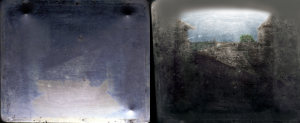
1827
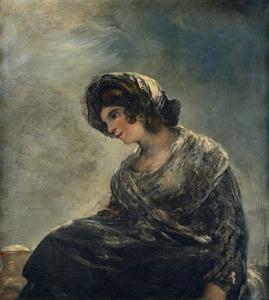
The Milkmaid of Bordeaux is an oil-on-canvas painting completed between 1825 and 1827, generally attributed to the Spanish artist Francisco Goya (1746–1828). This painting is believed to be one of Goya’s last works, completed the year before his death, and considered one of Goya’s masterpieces.
- 1827- Tamerlane and Other Poems is the first published work by American writer Edgar Allan Poe. The short collection of poems was first published in 1827. Today, it is believed only 12 copies of the collection still exist.
Evening Star is one of the Other Poems of Tamerlane
‘Twas noontide of summer,
And mid-time of night;
And stars, in their orbits,
Shone pale, thro’ the light
Of the brighter, cold moon,
‘Mid planets her slaves,
Herself in the Heavens,
Her beam on the waves.
I gazed awhile
On her cold smile;
Too cold—too cold for me—
There pass’d, as a shroud,
A fleecy cloud,
And I turned away to thee,
Proud Evening Star,
In thy glory afar,
And dearer thy beam shall be;
For joy to my heart
Is the proud part
Thou bearest in Heaven at night,
And more I admire
Thy distant fire,
Than that colder, lowly light.
- March 26, 1827 – German composer Ludwig van Beethoven dies in Vienna, after a prolonged illness. Thousands of citizens line the streets for the funeral procession 3 days later.
- The seven-note “do-re-mi” system of musical notation is introduced, though it does not become common until after the Civil War.
- I’d Be a Butterfly ” w.m. Thomas Haynes Bayly (October 13, 1797 – April 22,1839)
I’ D be a Butterfly born in a bower,
—Where roses and lilies and violets meet;
Roving for ever from flower to flower,
—And kissing all buds that are pretty and sweet!
O could I pilfer the wand of a fairy,
—I’d have a pair of those beautiful wings;
Their summer days’ ramble is sportive and airy,
—They sleep in a rose when the nightingale sings.
Muss i denn (German for “must I, then”) is a German folk-style song in the Swabian German dialect that has passed into tradition. The present form dates back to 1827, when it was written and made public by Friedrich Silcher.
The melody and some verses of this song became widely known through Elvis Presley‘s adaptation “Wooden Heart” in 1960, as well as Joe Dowell‘s version in 1961, becoming one of the most widely known German songs ever
1828
1828 – Dr. St. Peter Damian becomes a Doctor of the Church
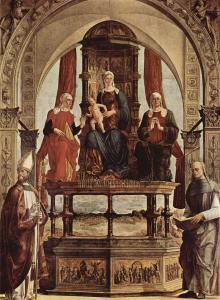
Any cleric or monk who seduces young men or boys, or who is apprehended in kissing or in any shameful situation, shall be publicly flogged and shall lose his clerical tonsure. Thus shorn, he shall be disgraced by spitting in his face, bound in iron chains, wasted by six months of close confinement, and for three days each week put on barley bread given him toward evening. Following this period, he shall spend a further six months living in a small segregated courtyard in custody of a spiritual elder, kept busy with manual labor and prayer, subjected to vigils and prayers, forced to walk at all times in the company of two spiritual brothers, never again allowed to associate with young men.
Letter 31:38. To Pope Leo IX, A.D. 1049.
The Fathers of the Church, Medieval Continuation, Peter Damian: Letters 31-60, Owen J. Blum, tr., Catholic University of America Press, vol. 2, p. 29.[1]
- April 20,1828 – French explorer René Caillié becomes the first non-Muslim to enter Timbuktu, and later return alive.
- May 26, 1828 – Supposed feral child Kaspar Hauser is discovered in Nuremberg, Germany.
- Franz Schubert, Austrian composer (January 31, 1797 – November 19,1828) dies.
- December 3, 1828 – 1828 United States presidential election: Andrew Jackson is elected President # 7 of the United States, defeating incumbent John Quincy Adams in a landslide.
- In 1805, most of Detroit, including the Basilica of Sainte Anne de Détroit (Sainte-Anne-de-Détroit) which was founded on July 26, 1701 by French colonists in New France, and is the second-oldest continuously operating Roman Catholic parish in the United States. was destroyed in an accidental fire. A new church building was not begun until 1818, and it was not completed until 1828. – American Catholic History
1829
NEW POPE
- March 4 – Andrew Jackson is sworn in as the seventh President of the United States.
- March 31, 1829 – Pope Pius VIII succeeds Pope Leo XII as the 253rd pope.
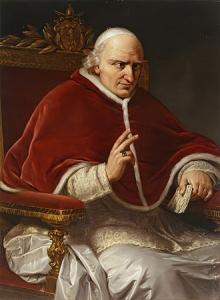
- March 11 – The German composer Felix Mendelssohn (age 20) conducts the first performance of Johann Sebastian Bach‘s St Matthew Passion since the latter’s death in 1750, at the Sing-Akademie zu Berlin; the success of this performance sparks a revival of interest in Bach.
- April 13, 1829 – The Catholic Relief Act is passed by the Parliament of the United Kingdom, granting a substantial measure of Catholic emancipation in Britain and Ireland.
- May 6, 1829 – The patent for an instrument called the accordion is applied for by Cyrill Demian (officially approved on May 23).
- Maria Anna Mozart (July 30, 1751 – October 29, 1829) dies. She was a musician, the older sister of Wolfgang Amadeus Mozart (1756–1791) and daughter of Leopold (1719–1787) and Anna Maria Mozart (1720–1778).
- Gioachino Rossini – William Tell Overture
Next Time on
HOARATS
Mark Twain and the Wellerman Come on a Comet – 1830 – 1839
To Understand
What I love and How I Write About History
Hit the Link Above.
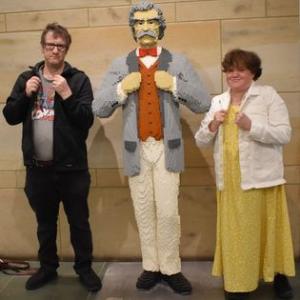
To understand about this particular series I’m writing about, please read
The Catholic Bard’s Guide To History Introduction
And to view a historical article click on








